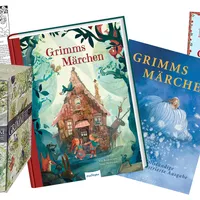Das arme Mädchen
The poor girl
La pobre chica
La pauvre fille
La povera ragazza
かわいそうな少女
Het arme meisje
A pobre rapariga
Бедная девочка
Zavallı kız
Бідолашна дівчинка.
可怜的女孩
Es war einmal ein armes, kleines Mädchen, dem war Vater und Mutter gestorben, es hatte kein Haus mehr, in dem es wohnen, und kein Bett mehr, in dem es schlafen konnte, und nichts mehr auf der Welt, als die Kleider, die es auf dem Leibe trug, und ein Stückchen Brot in der Hand, das ihm ein Mitleidiger geschenkt hatte; es war aber gar fromm und gut.
||||poor||girl||||||died|||||||||||||||||||||||||||clothes|||||love|took|||little piece|bread|||||||kind-hearted||||was||any|pious||
Once upon a time there was a poor little girl whose father and mother had died, and she had no house to live in, no bed to sleep in, and nothing in the world but the clothes she wore on her body and a piece of bread in her hand that a compassionate man had given her; but she was quite pious and good.
C'era una volta una povera ragazzina a cui erano morti padre e madre, non aveva più una casa in cui vivere e nessun letto in cui dormire, e al mondo non era rimasto altro che i vestiti che lui lo indossava sul corpo e nella sua mano un pezzo di pane che un uomo compassionevole gli aveva dato; ma era pio e buono.
옛날 옛적에 아버지와 어머니가 돌아가시고 살 집도, 잠잘 침대도, 세상에 가진 것이라곤 자비로운 사람이 준 옷과 손에 쥐어준 빵 한 조각뿐인 가난한 소녀가 있었는데, 그 소녀는 매우 경건하고 착했습니다.
Da ging es hinaus, und unterwegs begegnete ihm ein armer Mann, der bat es so sehr um etwas zu essen, da gab es ihm das Stück Brot; dann ging es weiter, da kam ein Kind und sagte: „Es friert mich so an meinem Kopf, schenk mir doch etwas, das ich darum binde", da tät es seine Mütze ab und gab sie dem Kind.
|went||out||on the way|met|||poor|||begged|it||||||||||||piece|||||||came|a|||||freezes|||it|||give||||||therefore|bind|then|did|||hat||||||
Then it went out, and on the way, a poor man met it, who begged so much for something to eat, so it gave him the piece of bread; then it continued, and a child came and said: "I'm so cold on my head, please give me something to wrap it with", so it took off its hat and gave it to the child.
Uscì dunque, e per strada incontrò un pover'uomo che tanto la pregava per qualcosa da mangiare che gli diede il pezzo di pane; Poi andò avanti, venne un bambino e disse: "Ho così freddo alla testa, dammi qualcosa da legarci intorno", così si tolse il berretto e lo diede al bambino.
Und als es noch ein bißchen gegangen war, da kam wieder ein Kind, und hatte kein Leibchen an, da gab es ihm seins; und noch weiter, da bat eins um ein Röcklein, das gab es auch von sich hin, endlich kam es in Wald, und es war schon dunkel geworden, da kam noch eins und bat um ein Hemdlein, und das fromme Mädchen dachte: Es ist dunkle Nacht, da kannst du wohl dein Hemd weggeben, und gab es hin.
|||||||||||||and|had||shirt||||||its|||||||||little dress||||||||||||||||||||||||begged|||shirt|||pious||thought||||||||||shirt|give away||||
And as it had walked a little further, another child came, without a shirt on, so it gave him its own; and even further, one asked for a little coat, and it also gave it away, finally it came into the forest, and it was already dark, then another one came and asked for a shirt, and the kind girl thought: It is a dark night, so you can surely give away your shirt, and gave it away.
E quando fu andato un po' più in là, venne un altro bambino che non aveva il corsetto, così glielo diede; e più avanti una chiese una gonnellina, alla quale anche lei rinunciò, finalmente venne nella foresta, ed era già buio, poi venne un'altra e chiese una canottiera, e la pia fanciulla pensò: È notte buia , probabilmente puoi regalare la tua maglietta e l'hai data.
Da fielen auf einmal die Sterne vom Himmel und waren lauter harte, blanke Taler, und ob es gleich sein Hemdlein weggegeben, hatte es doch eins an, aber vom allerfeinsten Linnen, da sammelte es sich die Taler hinein und ward reich für sein Lebtag.
|fell|||||||||purely|hard|shiny|coins||||||shirt|given away||||one||||very finest|linen|there|gathered||||coins|||||||leapt
Suddenly, the stars fell from the sky and turned into hard, shiny coins, and even though he had given away his shirt, he still had one on, but made of the finest linen, so he gathered the coins in it and became rich for the rest of his life.
Improvvisamente le stelle caddero dal cielo e non erano altro che talleri duri e lucenti, e anche se regalava la sua camicietta, ne indossava ancora una, ma di lino finissimo, così vi raccolse i talleri e divenne ricca per tutta la vita .
갑자기 하늘에서 별이 떨어져 딱딱하고 빈 탈러가 가득했고, 그는 셔츠를 다 벗어버렸지만 최고급 리넨으로 된 셔츠를 입고 있었기 때문에 탈러를 모아서 평생 부자가되었습니다.

